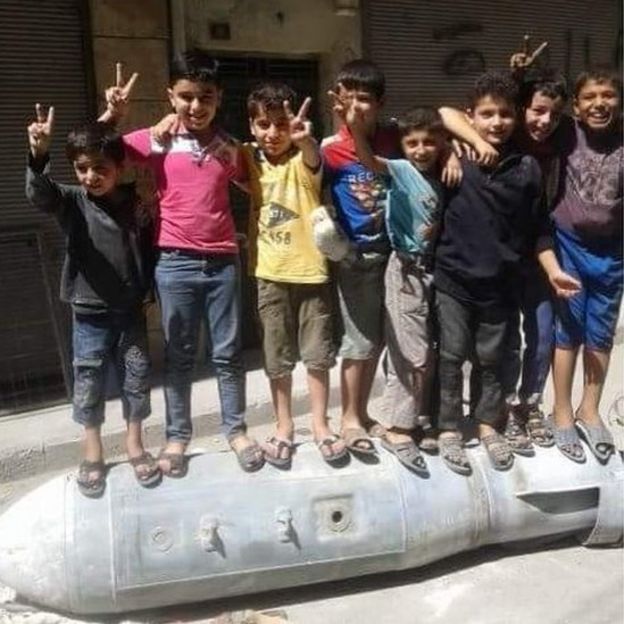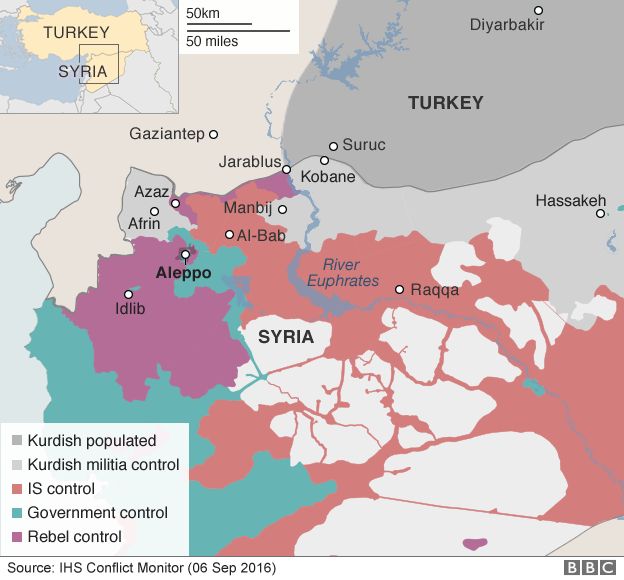
This article is more than
9 year oldIf the truce holds for seven days, the US and Russia will carry out co-ordinated air strikes against jihadist militants.
The Syrian army says it is observing the truce but it is still unclear whether rebels will abide by it.
The cessation of violence followed a weekend of air strikes by government forces on several rebel areas.
After the ceasefire came into effect at sunset on Monday, the Syrian army announced a seven-day "freeze" on military operations.
The Syrian Observatory for Human Rights monitoring group reported that calm appeared to be prevailing on most front lines.
The deal was struck on Friday in Geneva after months of talks between Russia and the US.
The opposition Free Syrian Army group has said that while it will "co-operate positively" with the ceasefire, it was concerned it would benefit the government.
Another major rebel group, the hardline Islamist Ahrar al-Sham, initially rejected the deal but later appeared to have softened its stance.
Opposition sources quoted by Reuters said that a forthcoming statement supporting the cessation "with harsh reservations" would be backed by "the largest groups", including Ahrar al-Sham.
Speaking earlier, President Bashar al-Assad welcomed the deal but said the Syrian state was still "determined to recover every area from the terrorists, and to rebuild".
The cessation of violence is due to be renewed every 48 hours.
Even before the ceasefire came into effect there were signs of problems with the plan.
Armed opposition groups have formed alliances to fight the Syrian army. They range from groups supported by the Americans and their allies to ones that have had links with al-Qaeda.
The ceasefire calls on US backed groups to separate from the others. They're reluctant to do so - one saying they're in the same trench, with joint operations rooms.
That is just one part of a complicated agreement that might crack open when it comes up against the realities of the Syrian war.
Over the weekend, the Syrian government carried out heavy air strikes in several rebel areas, killing about 100 people.
Russian warplanes were also in action in the provinces of Idlib and Aleppo, say Syrian activists.

Syrian children celebrate Eid in a warzone
Such intensification of violence has occurred before other, aborted, ceasefires in Syria.
"We hope there will be a ceasefire so that civilians can get a break. The shelling goes on night and day, there are targeted killings, besieged cities," said Abu Abdullah, who lives in Aleppo's rebel-held east.
"Civilians have no hope any more."
Under the plan, Syrian government forces will halt combat missions in specified opposition-held areas.
Russia and the US will then establish a joint centre to combat jihadist groups, including so-called Islamic State and Jabhat Fateh al-Sham (known until recently as the Nusra Front).
The conflict in Syria, which began with an uprising against Mr Assad, has raged for five years and claimed the lives of more than a quarter of a million people.
More than 4.8 million have fled abroad, and an estimated 6.5 million others have been displaced within the country, the UN says.

Jihadist groups like so-called Islamic State and Jabhat Fateh al-Sham face the joint might of the Russian and US air forces
Moderate rebels and civilians in the areas they hold will no longer face the threat of indiscriminate air strikes such as barrel-bombing although the Syrian air force will not be grounded completely; aid deliveries will be allowed to areas currently under siege
President Assad will be in a stronger position as the US and Russia engage two of his most effective military opponents while moderate rebels observe the truce with his forces

February 2012: Syrian government "categorically rejects" an Arab League plan calling for a joint Arab-UN peacekeeping mission
June 2012/January 2014/January 2016: Three failed UN-sponsored peace conferences in Geneva
September 2013: Kerry and Lavrov negotiate a deal to strip the Syrian government of its chemical weapons in return for the US backing away from air strikes. Since then, the government has again and repeatedly been accused of using toxic chemicals against rebel-held areas
February 2016: World powers agree in Munich on a nationwide "cessation of hostilities" in Syria excluding jihadist groups. There is no agreement on any joint US-Russian operations. The "pause" quickly unravels as Assad promises to regain control of the whole country
March 2016: President Vladimir Putin declares "mission accomplished" in Syria and orders removal of "main part" of Russia's air army in Syria. Russian air strikes have continued ever since
